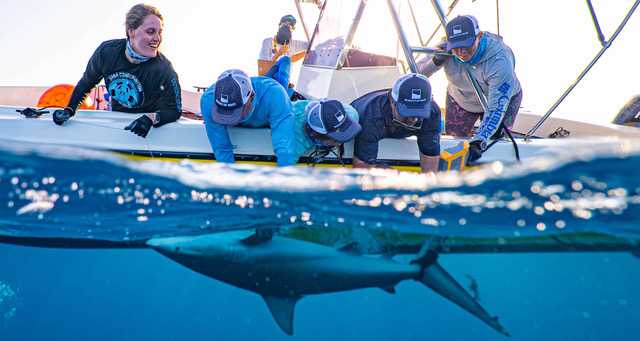Caribbean Shark Coalition Launched to Promote Training, Impact, and Collaboration around shark protections in the Greater Caribbean Region
The Dutch Caribbean Nature Alliance (DCNA) and Beneath the Waves (BTW) have launched the Caribbean Shark Coalition (CSC), an innovative, new platform to bring key stakeholders, researchers, governments and funders together to better collaborate and scale the impacts of science and policy within the entire Greater Caribbean region.
Represented are over 45 new members from NGOs, governments, and local businesses from 24 countries, which have formally joined the CSC to build capacity around research, policy, and education efforts for these threatened species in the region.
The Caribbean plays a key role in advancing the global target of protecting 30% of the worlds’ ocean by 2030. Under this vision, the CSC has three primary goals, which will be carried out through collaborative work and CSC-member projects. Firstly, the CSC will foster collaboration in shark and ray research, policy, and capacity building for conservation among stakeholders, and provide opportunities for knowledge transfer and data synthesis. The CSC will also seek to explore ways in which transboundary protections can be made to better safeguard the long-term health of shark and ray populations. Finally, the CSC aims to promote a sustainable future for these species as well as the human livelihoods who depend on them, by engaging local businesses, stakeholders, and private sector corporations.
“This is a historic moment for marine conservation efforts in the Caribbean,” says Tadzio Bervoets, Director of DNCA and a founding team member at the CSC. “We have been calling for transboundary marine protections in these waters, as we know that these apex predators are connecting ecosystems, reefs, fisheries, and nutrients across Exclusive Economic Zones. The CSC will help us to find and address critical knowledge gaps around sharks and rays in the region, and support collaborative research projects.”
Dr. Austin Gallagher, Chief Scientist of Beneath the Waves, shares, “Over the years we’ve had so many stakeholders from throughout the region express their interest in getting engaged in basic research or education around sharks, but a lack of resources or technical or operational expertise limited them from taking action.
He adds, “We hope The Coalition can play a role in creating that friendly, open, and supportive community those voices have been looking for.”
CSC members represent a collection of experts from NGOs, local communities, intergovernmental organizations and governments, academia, and policy institutes, and local businesses, working together to advance the study and conservation of sharks and rays found in the waters of the Greater Caribbean. The CSC will provide cross-disciplinary training, region-wide assessments, and will issue grants to CSC-member projects. The CSC will represent the interests and goals of members and, more broadly, sharks and ray species of the Caribbean at the UN (UNEP-CEP and the Regional Activity Center for the SPAW Protocols of the Cartagena Convention), IUCN-Caribbean, CITES, CMS, CBD, and other international gatherings.
For information visit www.caribbeansharks.co
Photo credit: Sami Kattan
About Dutch Caribbean Nature Alliance
The Dutch Caribbean Nature Alliance is a nonprofit organization created to safeguard nature in the Dutch Caribbean through supporting Protected Area Management Organizations. DCNA seeks to consolidate knowledge and bridge funding gaps for conservation within the Dutch Caribbean. DCNA maintains a central pillar in support, knowledge sharing and communication between the Dutch Caribbean islands.
About Beneath the Waves
Founded in 2013, Beneath the Waves is an ocean NGO using cutting-edge science to advance scientific discovery and catalyze ocean policy, with a focus on threatened species and ecosystems. Led by a group of established and emerging leaders in the marine conservation world, they have initiatives focusing on the conservation of biodiversity and highly migratory species such as sharks throughout the Atlantic, Caribbean, and Pacific Ocean. Their work has generated nearly 100 scientific publications, numerous first-ever discoveries, and they have been involved in the study and conservation of nearly 1 million square kilometers of marine protected areas.




















